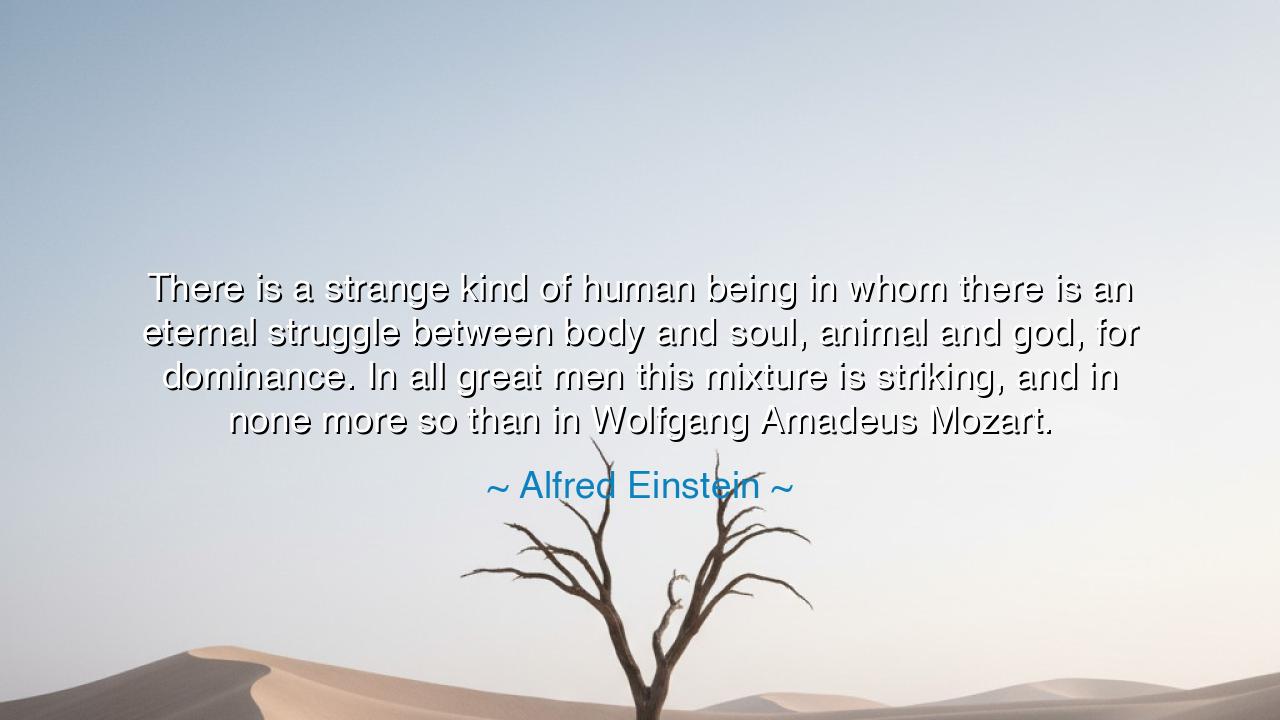
There is a strange kind of human being in whom there is an
There is a strange kind of human being in whom there is an eternal struggle between body and soul, animal and god, for dominance. In all great men this mixture is striking, and in none more so than in Wolfgang Amadeus Mozart.






Alfred Einstein, scholar of music and interpreter of genius, once proclaimed: “There is a strange kind of human being in whom there is an eternal struggle between body and soul, animal and god, for dominance. In all great men this mixture is striking, and in none more so than in Wolfgang Amadeus Mozart.” These words are no casual remark, but a deep meditation upon the dual nature of man, and especially upon the fiery contradiction that dwells in the souls of the truly great.
The meaning of this saying is that greatness is not born of harmony alone, but of tension. Within the extraordinary man, there lives both the animal, driven by hunger, desire, and earthly passion, and the god, yearning for transcendence, beauty, and eternal truth. The two wage constant war. To be merely animal is to sink into indulgence; to be merely divine is to lose touch with flesh and life. But when both dwell together in unquiet balance, the result is fire, creation, brilliance. Thus, Mozart—at once mischievous child of laughter and sublime vessel of heavenly music—embodied this eternal struggle.
The origin of Einstein’s words lies in his study of Mozart’s life and works. Mozart was no saintly ascetic, nor was he a brute. He was both playful and profound, both frivolous in jest and divine in melody. His letters brimmed with humor, irreverence, even vulgarity—the animal spirit alive in his daily self. Yet his music soared beyond the reach of earth, a voice of the soul, carrying strains that seem to echo eternity itself. It was precisely this duality, this union of body and soul, that made him more than mortal in the realm of art.
History bears many examples of this paradox. Consider Michelangelo, whose fiery temper and bodily passions lived side by side with his vision of the Sistine Chapel, where angels and prophets rise in grandeur. Or think of Beethoven, deaf and raging, often coarse in daily life, yet within his inner ear he heard the Ninth Symphony, a hymn of universal brotherhood. These were men torn between animal and god, yet it was this tearing that made them immortal. Greatness is not calm, but storm; not silence, but clash and thunder.
In truth, Einstein’s observation is not only about Mozart, but about the condition of humanity itself. Every person feels within them the pull of the flesh and the call of the spirit. In most, one side conquers the other, leaving a life either bound to earth or lost in the clouds. But in a rare few, the two remain locked in battle, neither yielding—and from that tension bursts forth creation that outlives centuries. To feel this eternal struggle is to be human at its highest pitch.
O children of tomorrow, learn this lesson well: do not despise the animal within you, nor imagine you can live as pure god. The greatness of man is to live in the battle, not to flee it. Use the strength of the body to feed the vision of the soul; let your passions drive you upward rather than drag you down. In the friction between the two lies the spark of genius, the flame that lights the world.
Therefore, the teaching is clear: embrace the struggle within. Do not lament that you are torn, but understand that all creation springs from tension. Mozart’s laughter and Mozart’s prayer, his jest and his divine symphony, were not contradictions but complements. So too in your own life—let the earthly and the heavenly wrestle, and from their contest draw power.
Thus Alfred Einstein’s words endure, not as mere tribute to Mozart, but as a truth for all ages: in the great, there is always the clash of animal and god, of body and soul. And it is not their peace, but their struggle, that gives birth to immortal works and to lives that echo across time.






AAdministratorAdministrator
Welcome, honored guests. Please leave a comment, we will respond soon